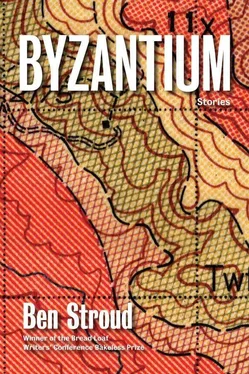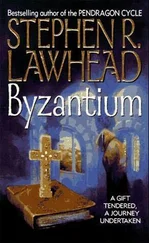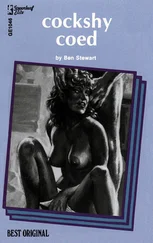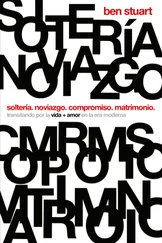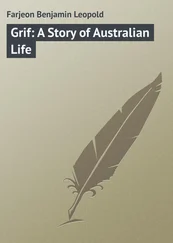Father Pascual blew the horn again. After the last echo, again from the slope, he came back.
Mota was baffled. When he asked Father Pascual what he was doing, the ex-Jesuit said he was listening for Tayopa. Mota felt a flash of sickness — they’d come all this way with a madman. He ordered Father Pascual to explain himself. “There’s a particular echo,” the man said. “One of the mountain Indians, who led Father Xavier to the mine, told him of it. Once we left the woman’s canyon, I could tell we were near. When you hear the echo, you’ve found the valley.”
“What does it sound like?” Mota asked, the sickness gone, replaced instead by something rarer, something like wonder.
The sackcloth bundle returned to the pack, Father Pascual pulled out his bedroll. “No, no,” he said. “I tell you, and then what am I worth? I don’t think so. I am not in the mood to have my throat slit.”
FOR THE NEXT THREE DAYS they continued east while Father Pascual climbed every slope and promontory and blew his horn. Mota’s fascination quickly dulled, and in the length of these days his mind refused to wander. He monitored the dry passages of his bowels, thought of the slight, pinkish mound that remained on the side of his belly, where he had been stuck with the cactus needle. At times it throbbed and he touched it. Pressing it made the throb sharpen then disappear.
He’d been fingering the needle wound when he was thrown by his horse. As they were riding across a gully, the horse stepped on a rattlesnake. Bit, it reared, and Mota landed in the gully’s creekbed, his leg catching against a rock. For a moment he lay dazed, trapped still in his thoughts, thinking the fall had happened there. Then a sharp pain streaked up his leg.
The others were shouting, and as Mota tried to sit up El Sepo pinned his shoulders. Baltazar’s impassive face, a frowning moon, hovered above him. He was their bonesetter, and as he felt along the leg, a new, dizzying pain cut through Mota’s flesh.
“Is it bad?” Fernando asked.
“An even break,” Baltazar answered. “It could be worse.”
Mota ignored the pain as he listened. He wanted to apologize, but was too ashamed to speak. Had he not been distracted, he might have checked his horse or at least landed better. The last thing they needed was yet more delay. He stared up at the sky, blue, distant; at the gnarled finger of an oak where a jay chirped and twitched its head. He counted days on his fingers. Tamotchala, the nearest town, was over two weeks away, and it was half lean-tos and tents. Mota tried sitting up again. He wanted to stand on his leg, to punish it, to let the pain surge through it, but El Sepo kept his hold on his shoulders. All the while his horse snorted in mad bursts. Its tackle jangled as it shifted and danced. It thought it could cast off the snakebite, but it was mistaken. It would have to be killed.
Baltazar, who’d left, now returned with branches and rope. He knelt over Mota and worked the bone, twisting and pushing it into place: Mota bit and groaned as the pain flashed then settled then flashed again. Above him was the sky’s clean blue, the undisturbed jay. At last the bone was set, and Mota lay there a moment, sweat dripping from his skin, then said, “The search is everything.
Leave me with provisions and a pistol.”
“Don’t be foolish,” El Sepo said. “We can make our camp here.”
“This is already slow work,” Mota said, then jerked his head at Father Pascual. “He has to blow that cursed horn forty times a day. If you stay here, it’ll slow the search even more.”
“But we can’t just leave you,” Fernando said.
“I agree,” Baltazar said. “Besides, you need shelter.”
“Take him to the woman’s hut,” offered Father Pascual, who’d been silent the entire time. “It’s not far.”
At this the others paused. Their search had been slow, and they could make the hut by nightfall. Fernando and Baltazar quickly took up the idea, and as they talked Mota remembered the feel of the woman — beating, warm — as he’d dragged her from the cave. Since they’d left her, the image of her feral body in its thin shift had pulled on his mind.
WHEN THEY ARRIVED AT THE HUT, at dusk, the woman was not to be found. Mota was not surprised. He had assumed she would startle at the first noise of their coming. The others carried him from the mule they had balanced him on to the bed, then brought in his pack and a pair of crutches Baltazar had fashioned. They sat with him for an hour and played cards. Mota thought he should say something, but he’d never encouraged intimacy, rarely inquired of his companions’ lives beyond the trail. El Sepo suggested, for the third time, that either he or Fernando stay with him, but Mota shook his head. “The mine,” he said.
In the morning, the woman still hadn’t appeared, and at this Mota felt a pinprick of sorrow. Father Pascual was already on his mule when El Sepo and Fernando took their leave, standing over him awkwardly, and Baltazar gave the leg a final inspection. Then they put on their hats and left, and Mota was alone, the wooden hut empty save for a pair of flies that traced a crooked path above him.
The hours crawled alongside the doorway’s shifting portion of sun. Maize leaves poked through the mattress and gave him sweat rashes. Mota stood only to piss and defecate into a bowl. Baltazar had cautioned him against using the crutches overmuch in the first days, and, his leg still throbbing, it was all Mota could do to make it to the door and scatter his waste.
A WEEK PASSED, a long, slow week. The woman never came to the hut, but, after the first days Baltazar had warned him of, Mota began hobbling around the clearing outside, then wandering farther up the canyon, working the crutches over roots and stone. His third day out he found her. As before, she was with the cattle. They stood in a rocky clearing, and she sat in the shade of a knobbly pine.
“Hello,” he called.
“You are walking,” she answered without looking up.
He hobbled closer, saw that a small red carcass lay at her side. Before her was spread the animal’s skin.
“I am,” he said. Though he hadn’t admitted it to himself, in his wandering he’d been looking for her. He thought to get nearer, but stopped himself, lest he rewake the mad fright she’d displayed when he pulled her from the cave. “I’m sorry to have forced you from your bed,” he added.
“It is no matter,” she said. She scraped at the skin.
“I’d be pleased if you returned,” he said. “I promise you, I am harmless. As you see, I’m slowed.” He tapped his leg and grinned. “I have books with me. Reports from Mexico. I could read to you, if you like. Surely, after so much time alone, you want for companionship.”
Her eyes remained down, on the skin, as if she did not hear him. But Mota knew something in her was curious. Otherwise she would have fled before he appeared, as she had done when he and the others had first ridden down toward her rock.
“Or poems — I have pamphlets left with me by one of my men. Winners from the city’s last competition and other such things.”
She hesitated in her scraping, then picked up the skin and, without meeting Mota’s eyes, retreated beyond the pine tree and into a clump of others. Mota’s leg ached from standing, and so with an unanswered farewell he pivoted on his good leg and swung himself back toward the cabin.
THE NEXT MORNING he went looking for Beatriz, but she did not allow herself to be found. The curiosity he had detected had been pure illusion, he decided, the sad imagining of a withered heart. But in the night that followed he was woken by breath on his face, an elbow sharply pinching his chest. His eyes opened to darkness, and in that first terror he flung out a hand. It struck a shoulder, ribs, the curve of a back. Beneath his palm flesh stretched against bone, surprisingly smooth. Fingers wrestled with his trousers and he helped, pushed the trousers down. The night phantom was astride him now, and, his leg stiff and awkward in its splint, the creaking bed’s maize leaves poking his back, they coupled, the woman’s grunting nothing like María Isabel’s dutiful cries. She held him at the shoulders, either to anchor herself or keep him pinned, and he bit his lips shut for fear of frightening her away. She groaned when he loosed himself, then waited for him to lengthen again.
Читать дальше
